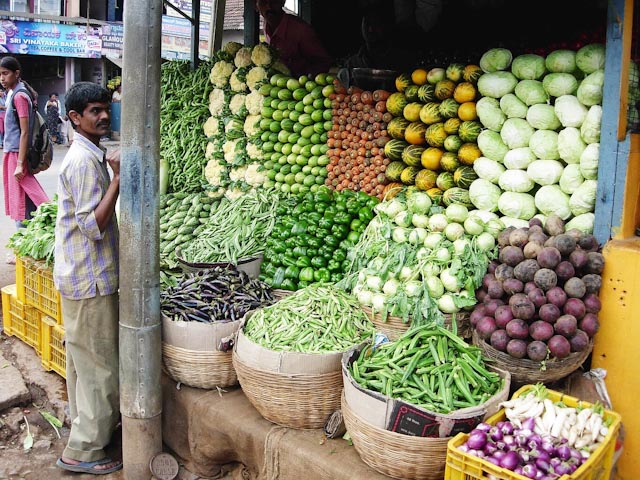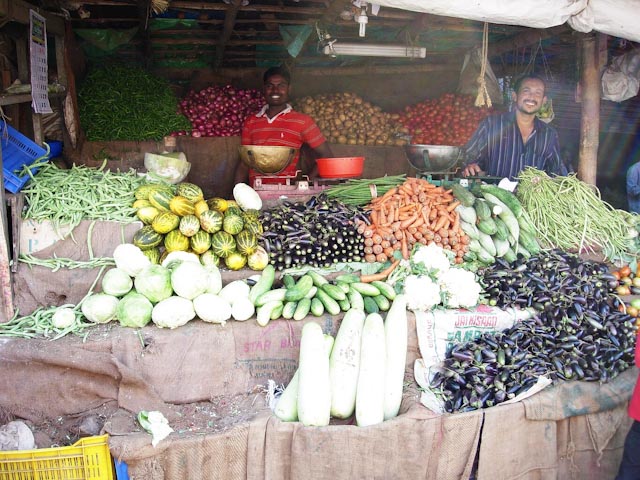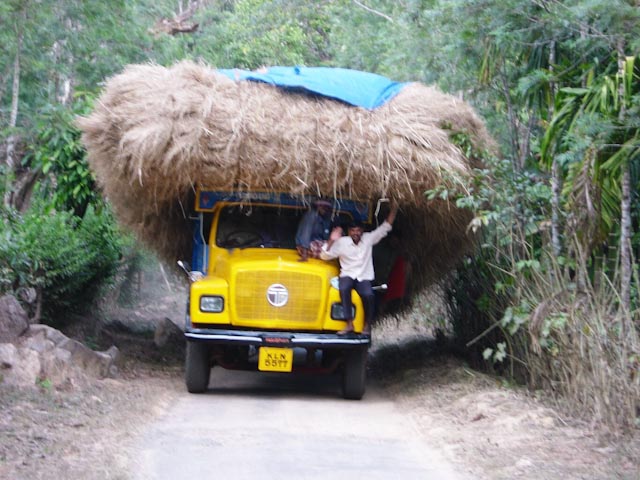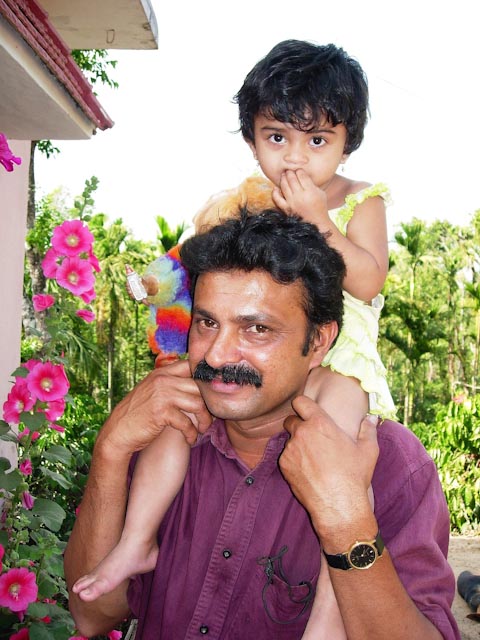Dervla Murphy would no doubt be delighted to know that Virajpet is still nowhere to be found in Lonely Planet’s guide to India, although it does say that catching the local buses allows you cheap viewing of scenery that is as 'pretty as a picture'.
Waiting for our bus to leave, an elderly man with a magnificent white handlebar moustache and wearing a navy baseball cap gets up from his seat to peer into my face. He asks me if I'm English, German or American.
'Neither,' I reply to his confusion. 'I'm Australian.'
'Ah. Austraaalian,' he mimics my tac-flat vowels.
I sometimes enjoy allowing people to guess where I'm from. One poor chap guessed Japan in desperation once, until I mimed a cricketer executing a forward defensive shot. They immediately get my nationality right then.
Elderly Gent has returned to his seat but he soon pops back up to ask me if I'm married.
Feeling flippant I reply, 'No. Are you asking?' He doesn't get my meaning beyond 'no' but three beautifully dressed ladies in pastel caramel, teal and bright canary yellow salwar kameez in the front seat do, and laugh behind their hands.
Another question occurs to this curious man and he pops up for a third time. 'Your age, Madam?'
I say 38, but he thinks I've said 28. 'Thirty-eight, thirty-eight,' say the ladies in the front. I write the number down on my notebook for him.
'Oh,' he says, with condemning finality.
This left me to contemplate the delightfully prolonged conversations Indians must carry on with 'normal' people who are married with children. Being old, single and kidless in India is equivalent to the party conversation-killer at home of saying you're an accountant.
Finally we've got enough bums-on-seats and we're off. I am pleasantly surprised to find the road to Virajpet is tarred and smooth. But Durga's toenails! This allows the driver to pander to his predilection for hurtling along at Ben Hur ramming speed. It is only now that I realise it may be entirely possible that the dissolved roads leading up the mountain may be the result of a deliberate policy to ensure drivers minimise their speed.
The scenery we are passing at lightening speed is indeed picturesque. There are white-walled red-tiled houses at regular intervals, some with the most immaculately kept gardens, others with coffee berries spread out drying on every available flat surface. High up steep shady banks, glossy leafed coffee plants are weighed down with unharvested berries and pepper vines streak up every available tree. On the flat lands there are bright green fledgling plantain crops that look like a kaleidoscope of resting butterflies, and the pale yellow stubby remnants of the latest paddy harvest, which would concur with DM's coverage of the Huthri Festival in mid December to initiate the harvest.
We have our own Hindi Hits soundtrack as we scoot along these well-kept roads lined with brilliant red poinsettias and we swing wildly around sharp corners in time with the frenetic beat.
About 5km out from Virajpet I notice cream and green signs indicating the Green Hills Estate and Hotel, the erstwhile home of DM's friend AC Thimmiah (Tim). He was then one of Coorg's largest landholders and as we pass yet another sign for Green Hills 3km down the road, I see that this has most likely remained unchanged, although the sign says his hotel is part of the Neemrana chain, so maybe Tim has had to make some pragmatic compromises.
Virajpet is a busy market town, DM described it as Coorg's commercial centre, and there is every kind of shop – small and large electrical goods, clothing shops ('The Passion Spot' certainly attracted my attention) and many sweet vendors and home ware shops in addition to many stalls stacked high with every kind of fruit and veg.

The street surface itself is a mix of cement and gravel and looks built to last. On each side of the street is a dirt gutter and a further sealed path for walking. School was out and a variety of colourful uniforms and equally colourful faces flooded the street. Catching a girl's eye and smiling is a recipe for her and her friends to dissolve into helpless giggles, although sometimes a brave boy will run up and say hello.
After buying three oranges at a roadside stall, I stopped in at a small sweet shop to purchase some biscuits, which the vendor pulled out of a deep glass jar and placed in a small plastic bag. The plastic packet was then placed in a paper bag. I had to stop the shopkeeper before he could place the package in yet another plastic bag. Talk about pass the parcel.
Having triangulated with three opinions, I set out on the road to Devangeri. My 35-year-old directions were pretty loose: 'after three miles the road divides at a rice mill. Take the left turn for another mile. Take the dirt track branching off to the right down a slope then look for a two-storey brown tiled house with verdigris columns.'
Walking out of town I pass fields full of paddy stubble with a planting of telegraph poles trailing off into the distance. I don't remember DM mentioning those.
A boy on a bicycle on his way home from school rides ahead of me and stops so that he can watch me walk towards him. Once I pass he cycles ahead again and stops. After he has done this four times I can contain myself no longer and say, 'You should walk. It's much quicker.'
The views along this road are pure pastoral prettiness and if I close my eyes I can imagine it is the country town where I grew up before it became a target for Sydney property buyers. After what feels like only one mile, I come to a turn-off that I sense rather than know is the correct one. I concede that the relatively new-looking cement steps up the steep hill out of town may have cut some miles off the route.
I pass one right hand turn as too premature and then hesitate before a gated road. Deliberate trespassing not being part of my plan I vacillate until I observe a figure in red and blue approaching through the trees. As the man comes nearer he gestures to me.
'Where are you going?'
'Devangeri?' I say hopefully.
'Devangeri that way,' he points in the direction I am already heading.
With the spring of confirmation in my step I continue along the narrowing track. I am passing the gates of houses and properties at regular intervals with names like 'Subbaidh', 'Charimanda', 'Bollachanda' and 'Kushalappa.' I can hear the voices of workers busy at picking coffee on either side and at one point a man in a maroon shirt speeds by on a motorbike.
At last, at the end of what is now a shady lane, is a gateway with the name 'Chengappa' woven in iron. This may be as close as I can get. DM's landlord for her stay in Devangeri was one Dr Chengappa. The garden beyond the gate is partially shielded with hedges and trees but I can see that it is neatly kept and pretty – I can also see glimpses of coffee drying.
I walk just beyond the end of the laneway and down a bank overlooking some bare fields. I sit in a shady spot and proceed to peel my oranges while I contemplate the view over the fields to some farmhouses, imagining that they could have been where DM stayed.
Soon I am joined by a lady wearing, what looks like, a dark red winter nightie. Naturally she is curious as to why she has just found a whitie sitting in her back paddock eating oranges.
I fish out my book and awkwardly tried to explain my sentimental raison d’être. From what I can gather, Dr Chengappa had four daughters, and this lady is one of them. I also gather that the area to my right, up to the farmhouses, is owned by Muslims and she seems to be warning me away. Her home, the Hindu owned land, is to our left.
I show her DM's book and the references to Dr Chengappa, and she touches her cheek in surprise. It has me wondering whether DM shared her book with the families mentioned therein, or whether it flew so low under the radar as to attract no notice.
The lady definitely recognises the name of Thimmiah (I now know it is pronounce ‘Tim-mire’) and associates it with Green Hills, so it is nice to have that much confirmed after all this time.
After leaving the laneway, instead of turning left and homeward, I turn right to explore further. I walk quite a way deep into coffee plantation territory, always promising myself to turn back after one more corner has been turned and revealed its view (that will probably make an appropriate memorial plaque for me one day: 'She just had to look around one more corner').
Shortly I hear a truck engine and soon a truck loaded with straw piled as high and wide as a house trundles towards me. I stand in the middle of the road to take a picture and when the driver stops I show him the picture on my camera.
 'Very good!' he says, and the two lads hanging off the front cab lean over and make a show of smoothing their hair while admiring my picture of them.
'Very good!' he says, and the two lads hanging off the front cab lean over and make a show of smoothing their hair while admiring my picture of them.
On the verge of turning back, a motorbike approaches me from behind. It is Mr Maroon Shirt who drove by earlier.
When I tell him I'm looking for the village of Devangeri he says, 'Come, I will show you.'
So, I must break another personal safety taboo and get on a motorbike. After seeing all the elegant Indian women riding side-saddle, it feels very indecorous sitting astride behind this man I have only just met.
We wind down and up narrow little paths and it feels like he is especially speeding up for the ruts and bumps in the road. When we pull up in front of a shed where some people are congregated, Maroon Shirt Man introduces me to his wife and some other family members. There is some commotion between them and a child is sent scooting up some steep steps up the hill to a house at the top.
Soon I am presented with a lemon soda and the child returns with a shy teenaged girl who speaks some English.
I am soon bundled off to meet the rest of the family. The Jeevan family home is up a steep drive to the left further down the road and sits on a plateau overlooking fields. They refuse to allow me to take my shoes off and usher me in to their living room to sit down on a couch facing the television.
The living room is adorned with family photos and the parents are duly pointed out. Asked if I was a Christian I say carefully, 'Well, my family are Christian.'
'We are Hindus,' Jeevanji says, indicating a two-foot statue of a standing Mary on top of the television.
'Er, Christian Mary...?' I venture perplexed.
'Yes, yes, Hindu.'
Now I'm really confused.
Jeevanji's mother-in-law is very anxious that I eat and drink something and soon she has returned from the kitchen out back with a tray of pineapple biscuits and a sweet lemon drink. Before I had even eaten one biscuit she comes out again to present me with three small greenish oranges.
'Oh, thankyou! That's very kind of you.'
After some more conversation about family details, their two-year-old daughter stumbles out of a bedroom bleary-eyed with sleep wondering what all the noise is about. The poor child takes one look at me and runs to Mummy. There is much laughter as they try to make her come to me, calling me 'Aunty' all the while. I don't blame the poor thing. I may even be the first white person she's seen.
With an eye on the time, I let them know I really must go if I am to beat the setting sun.
'No, you are staying here!' Jeevanji announces as if that has all been arranged before I got here. Oh-oh. I explain that all my things are in Madikeri and really I can’t (although what a lovely opportunity to pass up!) and eventually I am able to edge my way towards the door.
Jeevanji's mother-in-law became very excited and rushes back to the kitchen. As I am out the front taking some family pictures (ek-doh-teen-PANEER!) and Jeevanji is carefully printing his name and address in carefully rounded script for me, she rushes out, triumphantly holding out to me a huge green papaya. Oh you shouldn't have...really. Ye gods...
We're on the bike again and Jeevanji stops every time he sees someone, ostensibly to show me off.
'This is my elder brother,' he introduces me to an older version of himself driving a ute.
'These are my neighbours,' he indicates three more men as I hop off the bike at a junction. He points up another road branching away to the right. 'Devangeri one kilometre that way.'
It is 4pm and I still have to walk back to Virajpet before I can bus another hour to Madikeri. Oh well, there's always tomorrow. I trot off down the road, waving goodbye to Jeevanji, as the cannonball in my day bag pounds against my spine the whole way home.

Comments
Total Comments : ( ) You have to register to post a comment.
RECENT COMMENTS